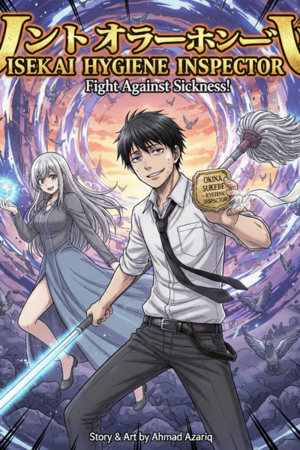Chapter 63:
Extra 3: The Humdrum Harmonies of Hierarchical Habitats
The Department of Extradimensional Affairs
While Director Quill, accompanied by the newly appointed Regulatory Strategist Chrysalis, was off battling rogue Council members and deciphering the secrets of the Interdimensional Bureaucratic Council, life within the Department of Extradimensional Affairs continued, albeit with a slightly different rhythm. The absence of the Director, while initially unsettling, had allowed a certain… organic order to emerge, a testament to the inherent resilience of a well-structured bureaucratic system.
Lyra, ever the diligent magic guardian in training, took it upon herself to ensure the magical wards protecting the floor remained at peak performance. This involved a daily ritual of chanting ancient regulatory incantations, a task she approached with a seriousness that belied her youthful appearance. The incantations, while seemingly nonsensical to the untrained ear, were actually complex spells designed to deflect regulatory interference, to enhance the Department's bureaucratic efficiency, and to ward off any unwanted extradimensional entities.
One particular afternoon, Lyra found herself struggling with a particularly stubborn incantation, a spell designed to fortify the Department's filing archives against unauthorized access. The words, a jumble of statutory spells and regulatory jargon, refused to flow smoothly, her voice faltering, her concentration wavering.
"Blast it all!" Lyra muttered under her breath, her brow furrowed in frustration. "Why can't I get this right? It's like trying to understand the fine print on a particularly convoluted insurance policy."
She paused, took a deep breath, and tried again, her voice rising in a crescendo of regulatory fervor. But still, the incantation refused to cooperate, the words twisting and turning, the magic fizzling out before it could take hold.
Suddenly, a voice broke through her concentration, a voice filled with a mixture of amusement and exasperation.
"Having trouble, Lyra?"
Lyra turned to see Grimsqueak, the Department's bureaucratic goblin, perched atop a towering stack of legal documents, his tiny fingers tapping impatiently on the pages.
"Grimsqueak!" Lyra exclaimed, her voice filled with a mixture of relief and annoyance. "What are you doing here? Can't you see I'm trying to concentrate?"
Grimsqueak chuckled, his sharp teeth gleaming under the dim office lights. "Concentrate?" he repeated, his voice filled with amusement. "You call that concentrating? You sound like a rusty filing cabinet trying to sing an opera."
Lyra glared at Grimsqueak, her eyes flashing with irritation. "Well, it's not easy, you know," she retorted. "This incantation is incredibly complex. It requires a deep understanding of regulatory law, a mastery of bureaucratic magic, and a voice that can shatter glass."
Grimsqueak chuckled again, his tiny body shaking with mirth. "Shatter glass?" he repeated, his voice filled with amusement. "You sound more like you're trying to shatter eardrums. Here, let me show you."
He hopped down from the stack of legal documents and approached Lyra, his tiny legs moving with surprising speed. He cleared his throat, took a deep breath, and began to chant the incantation, his voice clear, precise, and surprisingly powerful.
The words flowed smoothly from his lips, the magic taking hold, the air shimmering with regulatory energy. The incantation reached its crescendo, the office space filling with a sense of bureaucratic order, a feeling of regulatory security.
Lyra stared at Grimsqueak, her eyes wide with amazement. "That was incredible!" she exclaimed, her voice filled with admiration. "How did you do that?"
Grimsqueak shrugged, his tiny face filled with a mixture of pride and modesty. "It's all about understanding the regulatory language," he said, his voice filled with expertise. "You need to feel the rhythm, to understand the nuances, to appreciate the beauty of bureaucratic expression."
He paused, his eyes gleaming with a mischievous glint. "And maybe a little bit of goblin magic helps too," he added with a wink.
Lyra chuckled, her eyes filled with gratitude. "Thanks, Grimsqueak," she said. "I really appreciate your help. I don't know what I would have done without you."
Grimsqueak grinned, his sharp teeth gleaming under the dim office lights. "Anytime, Lyra," he said. "Just remember, even the most complex regulatory problems can be solved with a little bit of bureaucratic knowledge and a lot of goblin ingenuity."
Meanwhile, Rivet, the Department's ingenious inventor, was hard at work in his workshop, a chaotic space filled with spare parts, discarded paperclips, and half-finished inventions. He was currently focused on a particularly ambitious project, a device designed to translate regulatory jargon into plain English.
"It's a noble goal, Rivet," Umbral said, his voice filled with support, "but is it even possible? Regulatory jargon is practically a language of its own."
Rivet, his goggles perched atop his head, turned to face Umbral, a manic grin plastered across his face. "Possible? Of course, it's possible!" he exclaimed, his voice filled with enthusiasm. "With enough paperclips, a few discarded regulatory manuals, and a healthy dose of caffeine, anything is possible!"
He turned back to his workbench, his fingers flying across the keyboard, his eyes glued to the monitor. He was writing code, lines of regulatory algorithms designed to analyze the structure, the syntax, and the semantics of bureaucratic language.
"The key is to identify the patterns," Rivet explained, his voice filled with excitement. "To understand the underlying logic, to decipher the hidden meanings, and to translate the jargon into something that ordinary people can understand."
He paused, his eyes gleaming with a mischievous glint. "Of course, it's not just about translation," he added. "It's also about simplification, about clarification, about making the bureaucracy more accessible to everyone."
He turned back to his work, his fingers flying across the keyboard, his mind racing, trying to solve the complex problems that plagued his invention. He knew that it was a long shot, that the task was incredibly difficult, but he was determined to succeed.
He believed that his invention could make a real difference, that it could empower ordinary citizens, that it could hold the Council accountable, and that it could bring about a more just and equitable bureaucratic universe.
Umbral watched Rivet with a mixture of admiration and concern. He knew that Rivet was brilliant, that he was capable of incredible things, but he also knew that he was prone to overworking himself, to pushing himself to the limit, and to neglecting his own well-being.
"Rivet," Umbral said, his voice filled with concern, "you need to take a break. You've been working on this project for days. You need to rest, to eat, to recharge your batteries."
Rivet waved his hand dismissively, his eyes still glued to the monitor. "I can't stop now, Umbral," he said, his voice filled with determination. "I'm too close. I can almost see the finish line."
Umbral sighed, his heart filled with worry. He knew that he couldn't force Rivet to stop, that he had to let him pursue his passion, but he couldn't help but feel concerned for his friend's health.
He decided to take a different approach, to try to support Rivet in a way that would help him without interfering with his work. He went to the Department's break room and brewed a pot of strong, black coffee, adding a generous dose of caffeine to give Rivet an extra boost.
He returned to the workshop, carrying the pot of coffee and a stack of regulatory manuals, which he placed on Rivet's workbench.
"Here, Rivet," Umbral said, his voice filled with kindness. "Some coffee and some reading material to keep you going. And remember, take care of yourself. We need you at your best."
Rivet looked up from his work, his eyes filled with gratitude. "Thanks, Umbral," he said, his voice filled with gratitude.
As Rivet delved deeper into the intricacies of regulatory translation, Zinnia, the Department's resident hacking intern, was engaged in her own form of clandestine activity. While Director Quill and Regulatory Strategist Chrysalis were busy dismantling the Council's power structure, Zinnia felt it was her duty to ensure the Department's digital defenses remained impenetrable. This involved a constant cat-and-mouse game with Council's digital security forces, a dance of firewalls and encryption algorithms that kept her on her toes.
"They're getting bolder," Zinnia muttered to herself, her fingers flying across the keyboard, her eyes glued to the cascading lines of code. "Their intrusion attempts are becoming more sophisticated, more targeted. They're definitely after something."
She paused, her brow furrowed in concentration, her mind racing, trying to anticipate the Council's next move. She knew that they wouldn't give up easily, that they would continue to probe the Department's defenses, searching for any weakness, any vulnerability they could exploit.
"I need to be one step ahead of them," Zinnia said, her voice filled with determination. "I need to anticipate their attacks, to fortify our defenses, and to turn their own tactics against them."
She began to implement a new security protocol, a complex system of dynamic firewalls and adaptive encryption algorithms designed to thwart even the most sophisticated intrusion attempts. The system, which she affectionately referred to as "The Paperclip Fortress," utilized a network of interconnected paperclip-shaped sensors that could detect and neutralize any unauthorized access attempts.
"It's a bit unorthodox," Zinnia admitted to herself, "but it's surprisingly effective. And besides, Rivet would be proud."
As she worked, she noticed a strange anomaly in the Council's network traffic, a series of encrypted packets that seemed to be originating from within the Department itself.
"What's this?" Zinnia muttered, her voice filled with suspicion. "A mole? A double agent? Someone within our own ranks is feeding information to the Council?"
She began to trace the packets, following their path through the Department's network, searching for their source. The trail led her to a seemingly innocuous printer in the Department's break room, a device that was used primarily for printing out regulatory memos and bureaucratic announcements.
"A printer?" Zinnia repeated, her voice filled with disbelief. "How could a printer be sending encrypted data to the Council?"
She examined the printer more closely, her fingers tracing the intricate circuitry, her eyes scanning the internal components. She discovered a hidden microchip, a tiny device that had been cleverly concealed within the printer's power supply.
"Aha!" Zinnia exclaimed, her voice filled with triumph. "A Council spy device! They're using this printer to siphon off our data, to monitor our activities, and to undermine our operations."
She quickly disabled the microchip, severing its connection to the Council's network, and then began to analyze the data it had transmitted. She discovered a treasure trove of information, including copies of regulatory memos, transcripts of internal meetings, and even a few personal emails.
"They've been spying on us for months!" Zinnia exclaimed, her voice filled with outrage. "They know everything about us, our plans, our weaknesses, our vulnerabilities."
She knew that she had to alert Director Quill and Regulatory Strategist Chrysalis immediately, to warn them about the Council's infiltration and to prepare them for the inevitable counterattack.
She sent a secure message to Director Quill's encrypted comm channel, detailing her findings and urging him to return to the Department as soon as possible.
"This is serious, Director Quill," Zinnia wrote. "The Council has infiltrated our ranks. We need your leadership, your expertise, and your bureaucratic brilliance to deal with this crisis."
As she waited for Director Quill's response, Zinnia couldn't help but feel a sense of unease, a feeling that they were being watched, that they were surrounded by enemies, and that their every move was being monitored.
She knew that the battle against the Council was far from over, that it was just beginning, and that they would need to be more vigilant, more resourceful, and more determined than ever before to survive.




Please sign in to leave a comment.